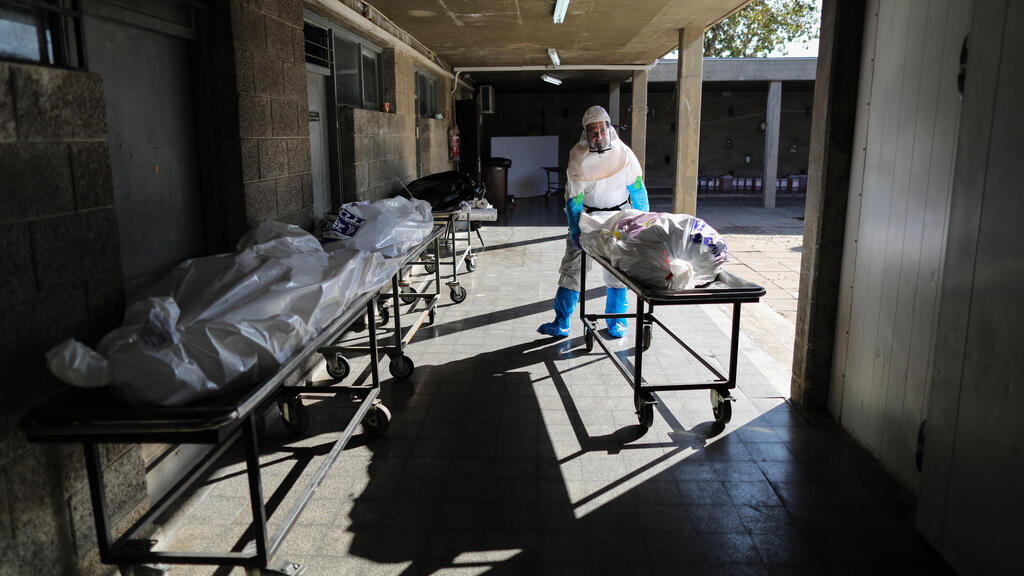Some think Israel should be congratulated for a relatively low death rate from coronavirus with around 4,000 Israelis having succumbed to the virus since the start of the pandemic.
But countries that have suffered a much higher death toll per capita, such as Sweden or Spain, have a considerably older population. Countries with a population as young as Israel's have seen fewer fatalities.
5 View gallery


Victims of COVID-19 being prepared for burial at Holon cemetery in central Israel, Jan. 2021
(Photo: EPA)
As much as the government enjoys boasting about its successful rollout of coronavirus vaccines, it should also recognize that the number of COVID-19 related deaths from complications of the disease, and the burden felt by hospitals as seriously ill patients fill up dedicated wards, demonstrates its failures in managing the crisis.
The leadership of the country has lost the confidence of Israelis after a string of poor conduct by senior members of the cabinet.
Just last week, while the country struggled under a third lockdown to curb the spread of the virus, Transportation Minister Miri Regev attended a birthday party at her office with more than a dozen staff members in attendance, wearing no masks and maintaining no social distancing.
5 View gallery


Transportation Minister Miri Regev and dozens of her staff during a birthday celebration held in violation of coronavirus lockdown restrictions last week
(Photo: Twitter)
This was not her first violation of restrictions, nor was she the first politician to have flouted health regulations.
Prime Minister Benjamin Netanyahu and President Reuven Rivlin hosted family members at Passover during the first lockdown, even as the rest of the country was deprived of celebrating with elderly parents and with many marking the holiday on their own.
Trust further eroded when Israelis realized that enforcing the coronavirus lockdown was far from uniform. The government proved unable or unwilling to crack down on ultra-Orthodox communities that kept their schools open and held mass gatherings almost without interruption.
The political motivation behind the government's conduct was evident and is only increasing with the fourth election cycle in only two years scheduled for March. The prime minister is seemingly more concerned with re-election than he is with public health.
5 View gallery


Hundreds of ultra-Orthodox men attend wedding in Modi'in Illit in violation of lockdown restrictions
(Photo: Itamar Kirshenbaum)
Israel also failed to prevent coronavirus spread when it kept its international airport open and allowed people to enter the country without being tested.
Many of those arrivals then went on to violate self-quarantine rules, causing a surge in cases - particularly in the Arab and ultra-Orthodox sectors.
Lockdowns cause untold harm to the economy and to people's emotional health, and should have been avoided had they not been the only effective way to lower contagion.
The danger of Israeli hospitals being overrun was the ultimate reason for such strict restrictions to be imposed.
After years of starving hospitals of funds, the government vowed to increase professional staff and beds to meet the need, but according to hospital administrators, who demonstrated outside the Finance Ministry last week, the promises have not been kept.
Fighting COVID-19 costs hospitals billions of shekels each week but the government continues in its failure to protect the elderly and most vulnerable in its population from contracting the virus, so more elderly patients require hospitalization, suffer severe illness and all too often die from its complications.
5 View gallery


A coronavirus ward at the Hillel Yaffe Medical Center in Hadera
(Photo: Getty Images)
As a small country, well-versed in emergencies, mass casualty events and dangerous situations, many Israelis have shown they understood the risks from coronavirus.
Most of the population wears masks when in public, no small feat compared to other Western nations.
Israel also leads the world in testing for the virus, which after a slow start was accelerated and made available all over the country, thanks to the health funds and their infrastructure.
But tracing and disrupting the chains of contagion, an effort assigned to the IDF Home Front Command months after the pandemic began, have still not met expectations.
5 View gallery


Cars line up outside a drive through testing site in Tel Aviv, January 2021
(Photo: Nitzan Dror)
Even when lockdown restrictions were lifted, the government failed to carry-out its own declared policies for a phased exit. Ministers succumbed to the pressure from groups looking out for their own interests.
The achievements gained from the lockdowns soon evaporated as the economy and schools quickly reopened, laying the foundations for the next lockdown to be imposed mere months down the road.
That lesson was not learned and will likely be ignored when this third lockdown comes to an end.
The bitter truth must be said. Only countries that enforced mitigation with an iron fist succeeded in limiting morbidity. All the others failed one way or the other.
There are no easy answers or solutions, but we must recognize that Israel could have been in far better shape and many lives could and should have been saved.

